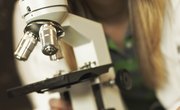Pre-medical -- or pre-med -- programs help to prepare students for the Medical College Admission Test -- known as the MCAT -- and the medical school curriculum. Some undergraduate programs may have a pre-med major or degree, and some may simply provide it as an educational track to assist students in this preparation. University staff usually includes pre-med advisers who consult with students interested in pursuing a career in medicine. The pre-med track requires the completion of a number of courses, and a higher GPA will increase your chances of getting into the medical school of your choice.
Biology
Nearly all medical schools require students to have completed at least two semesters of general biology with lab work, studying the processes of living things. These introductory courses include a range of topics from cell biology and physiology to evolutionary biology and microbiology. Additionally, the MCAT and many medical schools recommend more advanced courses such as microbiology, anatomy, physiology and genetics.
General Chemistry and Organic Chemistry
Two semesters of inorganic (general) chemistry, as well as two semesters of organic chemistry, with labs, are typically required of pre-med students. The MCAT, as well as medical schools, requires a foundation in topics like bonding, phases of matter, the periodic table and acids and bases. In addition, a sequence in organic chemistry is crucial for students preparing for medical school, since it specifically involves the processes of living things. More advanced chemistry courses like biochemistry are also highly recommended for medical school.
Physics
Students need two semesters of physics, with lab, to be fully prepared for medical school and the MCAT. These courses include basic concepts in matter and energy, including motion, gravity, light and electromagnetism.
Math
Pre-med students should take math courses through calculus, including college algebra, trigonometry and precalculus. Although calculus is not required for the MCAT, it is a prerequisite for the coursework of most medical schools. Check with your pre-med adviser and specific medical schools to find out their required coursework in math, since some schools do require courses beyond calculus.
General Education Requirements and Other Coursework
Most colleges require a series of core general education requirements to be completed to receive an undergraduate degree. Many of these courses can help prepare students for the MCAT and medical school as well. For example, a series of composition and English courses will prepare students for the verbal reasoning section of the MCAT, as well as for the medical school application process. A course in a behavioral science like psychology or sociology is also recommended for many medical schools. Additionally, some schools also recommend classes in diversity, ethics or medical terminology. Strong applicants tend to be well rounded and successful not only in science, but in other areas as well, such as history, foreign language and English literature.
Related Articles
References
Writer Bio
Gale Marie Thompson's work has been published in "Denver Quarterly," "Los Angeles Review" and "Best New Poets 2012." Thompson holds a BA in English and creative writing from the College of Charleston, a MFA from the University of Massachusetts Amherst, and is working on a PhD at the University of Georgia.










